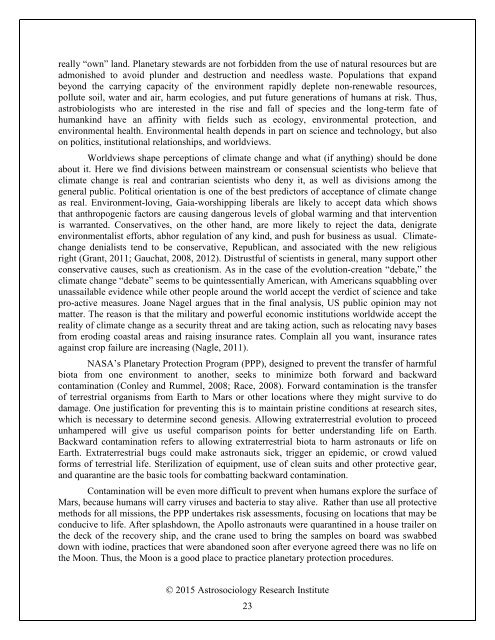THE JOURNAL OF ASTROSOCIOLOGY VOLUME 1
qd9nb3s
qd9nb3s
- No tags were found...
Create successful ePaper yourself
Turn your PDF publications into a flip-book with our unique Google optimized e-Paper software.
eally “own” land. Planetary stewards are not forbidden from the use of natural resources but areadmonished to avoid plunder and destruction and needless waste. Populations that expandbeyond the carrying capacity of the environment rapidly deplete non-renewable resources,pollute soil, water and air, harm ecologies, and put future generations of humans at risk. Thus,astrobiologists who are interested in the rise and fall of species and the long-term fate ofhumankind have an affinity with fields such as ecology, environmental protection, andenvironmental health. Environmental health depends in part on science and technology, but alsoon politics, institutional relationships, and worldviews.Worldviews shape perceptions of climate change and what (if anything) should be doneabout it. Here we find divisions between mainstream or consensual scientists who believe thatclimate change is real and contrarian scientists who deny it, as well as divisions among thegeneral public. Political orientation is one of the best predictors of acceptance of climate changeas real. Environment-loving, Gaia-worshipping liberals are likely to accept data which showsthat anthropogenic factors are causing dangerous levels of global warming and that interventionis warranted. Conservatives, on the other hand, are more likely to reject the data, denigrateenvironmentalist efforts, abhor regulation of any kind, and push for business as usual. Climatechangedenialists tend to be conservative, Republican, and associated with the new religiousright (Grant, 2011; Gauchat, 2008, 2012). Distrustful of scientists in general, many support otherconservative causes, such as creationism. As in the case of the evolution-creation “debate,” theclimate change “debate” seems to be quintessentially American, with Americans squabbling overunassailable evidence while other people around the world accept the verdict of science and takepro-active measures. Joane Nagel argues that in the final analysis, US public opinion may notmatter. The reason is that the military and powerful economic institutions worldwide accept thereality of climate change as a security threat and are taking action, such as relocating navy basesfrom eroding coastal areas and raising insurance rates. Complain all you want, insurance ratesagainst crop failure are increasing (Nagle, 2011).NASA’s Planetary Protection Program (PPP), designed to prevent the transfer of harmfulbiota from one environment to another, seeks to minimize both forward and backwardcontamination (Conley and Rummel, 2008; Race, 2008). Forward contamination is the transferof terrestrial organisms from Earth to Mars or other locations where they might survive to dodamage. One justification for preventing this is to maintain pristine conditions at research sites,which is necessary to determine second genesis. Allowing extraterrestrial evolution to proceedunhampered will give us useful comparison points for better understanding life on Earth.Backward contamination refers to allowing extraterrestrial biota to harm astronauts or life onEarth. Extraterrestrial bugs could make astronauts sick, trigger an epidemic, or crowd valuedforms of terrestrial life. Sterilization of equipment, use of clean suits and other protective gear,and quarantine are the basic tools for combatting backward contamination.Contamination will be even more difficult to prevent when humans explore the surface ofMars, because humans will carry viruses and bacteria to stay alive. Rather than use all protectivemethods for all missions, the PPP undertakes risk assessments, focusing on locations that may beconducive to life. After splashdown, the Apollo astronauts were quarantined in a house trailer onthe deck of the recovery ship, and the crane used to bring the samples on board was swabbeddown with iodine, practices that were abandoned soon after everyone agreed there was no life onthe Moon. Thus, the Moon is a good place to practice planetary protection procedures.© 2015 Astrosociology Research Institute23


